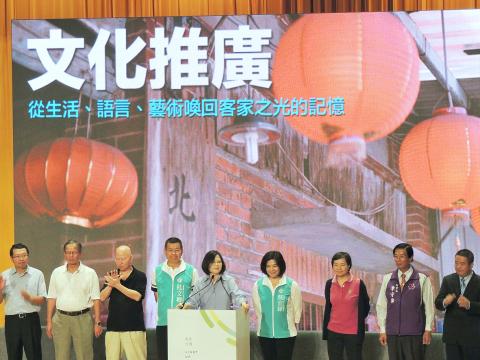Democratic Progressive Party (DPP) Chairperson Tsai Ing-wen (蔡英文) yesterday vowed to overturn a linguistic injustice to revive the Hakka language through a series of policy proposals, such as making Hakka a language of instruction at schools in predominantly Hakka communities.
“Due to a past policy of language repression [during the Martial Law era], many Hakka people, such as myself, are no longer able to speak Hakka. I believe many of your children or grandchildren are not able to speak Hakka fluently either,” Tsai told a crowd of more than 1,000 people, mostly Hakka, during a rally in Miaoli County. “I have said that one of my major policy objectives is to bestow transitional justice on society, and reviving Hakka is part of that objective to realize justice in language use.”
She said she would try to revive Hakka through creating a Hakka-friendly environment, including establishing schools, from kindergarten to elementary, in which the language of instruction would be Hakka in predominantly Hakka regions.

Photo: Lo Pei-der, Taipei Times
Tsai said the DPP is the only party that truly cares about Hakka culture.
“When the DPP was in power [from 2000 to 2008], we created the Hakka Affairs Council and Hakka TV,” Tsai said, adding that, if elected, she would increase the budget for Hakka TV, so it can produce more programs that appeal to both Hakka and non-Hakka audiences.
“If you go to [sections of] Provincial Highway No. 3 in Taoyuan, and Hsinchu and Miaoli counties that runs through Hakka communities, you would find abundant and diverse historic, cultural, artistic and agricultural resources,” Tsai said. “I often wonder why, when foreign tourists come to Taiwan, they often go to Taipei and then to the south or to the east, without visiting Taoyuan, Hsinchu and Miaoli counties. This is why I would like to make Provincial Highway No. 3 Taiwan’s own ‘Hakka Romantic Road’ to attract more visitors.”
While Hakka people, especially those in Miaoli, are generally considered pan-blue supporters, there was a surprising number of attendants from Hakka communities in Miaoli County, including traditional Chinese Nationalist Party (KMT) grassroots campaigners, such as councilors, township mayors, Farmers’ Association officials, and borough and village wardens.
“When I speak to people during my campaign, I feel people’s desire for change, and the nation’s development can only happen through change,” Tsai said when asked if she was attempting to connect with KMT campaigners.

The manufacture of the remaining 28 M1A2T Abrams tanks Taiwan purchased from the US has recently been completed, and they are expected to be delivered within the next one to two months, a source said yesterday. The Ministry of National Defense is arranging cargo ships to transport the tanks to Taiwan as soon as possible, said the source, who is familiar with the matter. The estimated arrival time ranges from late this month to early next month, the source said. The 28 Abrams tanks make up the third and final batch of a total of 108 tanks, valued at about NT$40.5 billion

A group from the Taiwanese Designers in Australia association yesterday represented Taiwan at the Midsumma Pride March in Melbourne. The march, held in the St. Kilda suburb, is the city’s largest LGBTQIA+ parade and the flagship event of the annual Midsumma Festival. It attracted more than 45,000 spectators who supported the 400 groups and 10,000 marchers that participated this year, the association said. Taiwanese Designers said they organized a team to march for Taiwan this year, joining politicians, government agencies, professionals and community organizations in showing support for LGBTQIA+ people and diverse communities. As the first country in Asia to legalize same-sex

MOTIVES QUESTIONED The PLA considers Xi’s policies toward Taiwan to be driven by personal considerations rather than military assessment, the Epoch Times reports Chinese President Xi Jinping’s (習近平) latest purge of the Chinese People’s Liberation Army (PLA) leadership might have been prompted by the military’s opposition to plans of invading Taiwan, the Epoch Times said. The Chinese military opposes waging war against Taiwan by a large consensus, putting it at odds with Xi’s vision, the Falun Gong-affiliated daily said in a report on Thursday, citing anonymous sources with insight into the PLA’s inner workings. The opposition is not the opinion of a few generals, but a widely shared view among the PLA cadre, the Epoch Times cited them as saying. “Chinese forces know full well that

Travel agencies in Taiwan are working to secure alternative flights for travelers bound for New Zealand for the Lunar New Year holiday, as Air New Zealand workers are set to strike next week. The airline said that it has confirmed that the planned industrial action by its international wide-body cabin crew would go ahead on Thursday and Friday next week. While the Auckland-based carrier pledged to take reasonable measures to mitigate the impact of the workers’ strike, an Air New Zealand flight arriving at Taipei from Auckland on Thursday and another flight departing from Taipei for Auckland on Saturday would have to